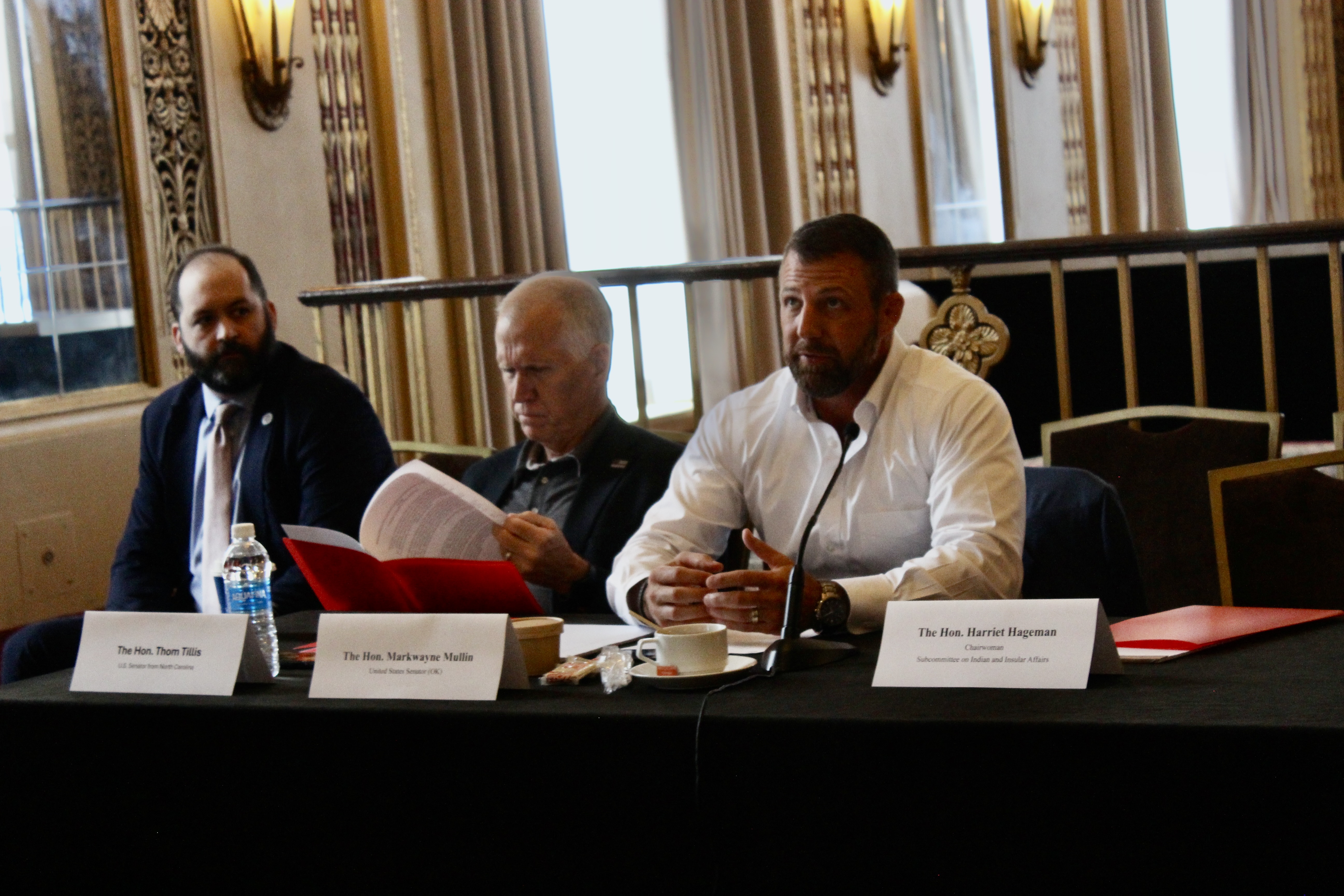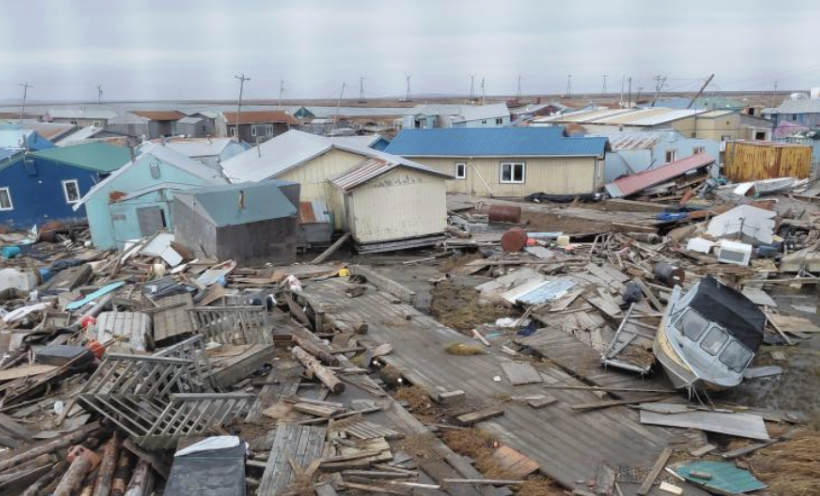
- Details
- By Marlon WhiteEagle
Native Vote 2024. MILWAUKEE, Wis. — On day three of the Republican National Convention (RNC), Senator Markwayne Mullin, a Republican from Oklahoma and an enrolled member of the Cherokee Nation, facilitated a panel between lawmakers and tribal representatives to discuss priorities.
Sen. Mullin recalled a conversation he had with former President Trump about six months ago.
“He was talking about some of the Indian policies that we had never got to when he was in office,” Sen. Mullin said. “We have to engage earlier and more often than that.”
The panel discussion was an attempt at engaging earlier to discuss Indian Country’s priorities, according to Sen. Mullin. Congressional members in the panel were: Wyoming Representative Harriet Hageman, North Carolina Senator Thom Tillis, and Kansas Senator Roger Marshall.
Rep. Hageman was elected to office on November 8, 2022, and serves on the House Natural Resources Committee and as chair of its subcommittee on Indian and Insular Affairs. Since taking office, Hageman has visited a “variety of tribal members” over the past 18 months.
“We have really focused on economic development, addressed the challenges associated with the Indian Health Service, and tried to address the issues of security and law enforcement,” Rep. Hageman said.
Rep. Hageman also mentioned budget considerations regarding the recent Supreme Court decision on IHS reimbursement to tribal nations.
Senator Thom Tillis said he was embarrassed by how little he knew about Native American tribes until he became a legislator. He served in the North Carolina House of Representative from 2007 to 2015 – as House Speaker from 2011 to 2015, and in the U.S. Senate since 2015.
Sen. Tillis mentioned his support for the Lumbee cultural center and compact negotiation with the Eastern Band of Cherokee for an additional casino.
“I took a lot of heat for that from the conservative right, but I felt like it was the right thing to do,” Sen. Tillis said.
Sen. Tillis refused to support the Lumbee Recognition bill in his first two years in office but has since supported it after doing his homework on the issue.
Sen. Tillis said he has gone to Alaska, Iowa, and Idaho to try to gain support for Lumbee recognition. He’s determined to “eliminate obstacles” and “hold up tribes getting in the way.”
“Not a day goes by where I’m not talking about this,” he said. “I don’t care what state your historical lands are in, you can count me in. I’ll be a third senator. All I’m asking from you, help me get the Lumbee recognized.”
Sen. Mullin ran the panel discussion like a congressional hearing. Kansas Senator Roger Marshall yielded his time, so we didn’t hear from him. Discussion moved to tribal leaders.
North Carolina General Assembly Representative Jarrod Lowery is a member of the Lumbee tribe and represents District 47 in Robeson County, North Carolina. He is the first republican Native American to serve in North Carolina’s General Assembly.
“North Carolina has the eighth largest Indian population in the U.S.,” Lowery said. “There are more Natives in North Carolina than North and South Dakota combined. It is Indian Country.”
Lowery said he is often asked why he is a republican.
“Because most of the time, our people just want to be left alone to be a self-determined people. I believe that republicans understand that,” he said.
Osage Nation Principal Chief Geoffrey Standing Bear spoke about the complex, and often contradictory, relationship between tribal nations and the federal government.
When the Osage Nation received funds from the Coronavirus Aid, Relief, and Economic Security (CARES) Act, they used it to open a meat processing plant and a 40,000 square foot greenhouse.
“We now have 2,000 head of cattle, and 300 bison. We are taking care of our people,” Standing Bear said. “Our food processing is done with aquaponics. We’re putting our people to work, but we want to make sure that we are self-sufficient.”
On the contrary, Chief Standing Bear pointed to the Department of Interior’s 71-pages of new policies that are harmful to the tribe’s oil and gas business and partners.
“Last April, we filed our protest against new regulations that were imposed upon us,” he said. “We bought our reservation, 1, 470, 000 acres, with our own money. That’s our land. The federal government comes in, says we’re going to do it, we’re going to take care of it. But you’re going to lose all your property.”
As a sovereign tribal nation, the Osage can enact and enforce laws that regulate their business, but the Bureau of Indian Affairs insists they are authorized to handle the issue.
“We can do it. We know how to do it. We know how to write our own laws,” Standing Bear said.
Now the Osage Nation has filed a lawsuit against the Department of Interior in the District of Columbia to get a legal decision on the matter. Standing Bear said he and the Osage people are “very upset” with the Department of Interior.
“When does this movie end? It’s a nightmare, is what it is,” he said. “I just hope this new administration will join us and make permanent changes, so we really are going to be self-sufficient.”
Marshall Pierite, who is the chairman and chief executive officer (CEO) of the Tunica-Biloxi Tribe of Louisiana, expressed his excitement for being present and for change.
Chairman Pierite spoke about three forms of change: information, reformation, and transformation.
“Information is of the mind, getting to know, and respecting each other,” Pierite said. “Reformation is changing the systems and structure that is needed. Transformation is where really opportunity begins. This is what is needed for Indian Country.”
Chairman Pierite believes the 574 tribal nations are America’s greatest assets. He said Tunica-Biloxi is small in terms of territory and population, but mighty in vision.
“I’m talking about using all three components of vision,” he said. “Hindsight: what we learn from our ancestors, or those that walked before us. Insight: what is happening now and how we can take advantage of opportunities that lie at our fingertips. Foresight: having the ability to look down the future and seeing what we define as a problem and taking that problem and turning it into a solution.”
Over the last 30 years, 11.2 million manufacturing jobs have left the U.S. Chairman Pierite envisions bringing those jobs back to the U.S., more specifically to tribal reservations.
Myron Lizer is the former vice president of the Navajo Nation and introduced himself in the Navajo language as he added to the discussion.
Lizer shifted to the ongoing effort to build a Navajo Code Talker Museum, which is situated on an opportunity zone.
“I don’t think there is a large opportunity zone project in Indian Country. I’d love to help make that happen,” Lizer said. “There are 13 census tracts of opportunity zones in Indian Country that could stand to use other people’s money. Funding is our major dilemma, there’s a shortage of it.”
Lizer, who is also a business owner, said Indian Country is open for business. He called it the “last frontier.”
“When even Walmart can’t find new land to develop for new stores or warehouses,” he said. “Has anybody looked at Indian Country? We need jobs. We need revenue. We want to be self-dependent. We want to be self-reliant.”
Lizer looks at Tesla’s partnerships with Nambe Pueblo and Sandia Pueblo as examples of how tribal nations build relationships with corporations. He also looks at what role the federal government has in making it easier for tribal nations and corporations to work together.
Adam Crepelle is a law professor at Loyola University Chicago who specializes in federal Indian law and policy, and economic development. Crepelle shared a quote from President Reagan: “The nine most terrifying words in the English language are: I’m from the government, and I’m here to help.”
“Indian Country knows this very well,” Crepelle said. “For thousands of years, tribes had vibrant free market economies. Copper from the Great Lakes made its way down to Florida and to Montana thousands of years ago.”
Crepelle said long before 1492, tribal nations did this out of economic initiative through institutions of trade to ensure they remained healthy, prosperous, and free.
“Unfortunately, much has changed for the worse in Indian Country. Economic freedom is scarce, and poverty is common,” he said.
Although some outdated laws and policies contribute, Crepelle says jurisdictional uncertainty is the main detriment to economic development on tribal lands.
“We still haven’t addressed that issue, unfortunately. As a result, private enterprise remains scarce in Indian Country,” Crepelle said. “The notable exception is Indian gaming. And guess what, Congress has legislated regarding Indian gaming.”
The Indian Gaming Regulatory Act (IGRA) was enacted in 1988 and allows for gaming on tribal lands. Crepelle says IGRA is “not perfect,” but provides clear rules.
“With that certainty, Indian gaming has become a $40 billion per year industry,” he said. “So if we can get more clear rules and greater certainty, Indian Country can thrive.”
Crepelle said as economic opportunity grows in Indian Country it benefits everybody, not just tribal citizens.
Help us tell the stories that could save Native languages and food traditions
At a critical moment for Indian Country, Native News Online is embarking on our most ambitious reporting project yet: "Cultivating Culture," a three-year investigation into two forces shaping Native community survival—food sovereignty and language revitalization.
The devastating impact of COVID-19 accelerated the loss of Native elders and with them, irreplaceable cultural knowledge. Yet across tribal communities, innovative leaders are fighting back, reclaiming traditional food systems and breathing new life into Native languages. These aren't just cultural preservation efforts—they're powerful pathways to community health, healing, and resilience.
Our dedicated reporting team will spend three years documenting these stories through on-the-ground reporting in 18 tribal communities, producing over 200 in-depth stories, 18 podcast episodes, and multimedia content that amplifies Indigenous voices. We'll show policymakers, funders, and allies how cultural restoration directly impacts physical and mental wellness while celebrating successful models of sovereignty and self-determination.
This isn't corporate media parachuting into Indian Country for a quick story. This is sustained, relationship-based journalism by Native reporters who understand these communities. It's "Warrior Journalism"—fearless reporting that serves the 5.5 million readers who depend on us for news that mainstream media often ignores.
We need your help right now. While we've secured partial funding, we're still $450,000 short of our three-year budget. Our immediate goal is $25,000 this month to keep this critical work moving forward—funding reporter salaries, travel to remote communities, photography, and the deep reporting these stories deserve.
Every dollar directly supports Indigenous journalists telling Indigenous stories. Whether it's $5 or $50, your contribution ensures these vital narratives of resilience, innovation, and hope don't disappear into silence.
 The stakes couldn't be higher. Native languages are being lost at an alarming rate. Food insecurity plagues many tribal communities. But solutions are emerging, and these stories need to be told.
The stakes couldn't be higher. Native languages are being lost at an alarming rate. Food insecurity plagues many tribal communities. But solutions are emerging, and these stories need to be told.
Support independent Native journalism. Fund the stories that matter.
Levi Rickert (Potawatomi), Editor & Publisher
















